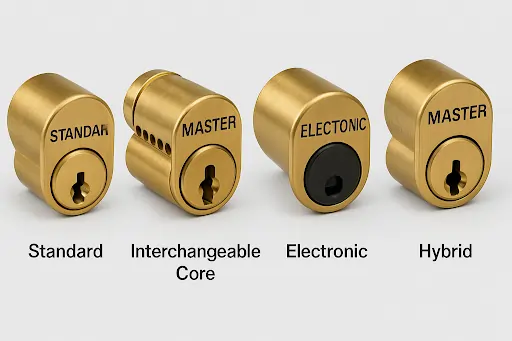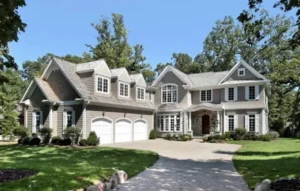Selecting the right master lock cylinder isn’t just about security — it’s about choosing a system that fits the scale, structure, and usage of your building. Whether you’re managing a multi-tenant office, a school campus, or a healthcare facility, the type of lock cylinder you choose determines how efficiently you can control access. Today’s electric lock manufacturers are offering a wide variety of master cylinder solutions that support traditional mechanical keys, smart access, or a hybrid of both.
At the core of these systems is the security master key — a key that unlocks multiple access points based on a tiered permissions system. According to a 2024 Security Industry Association report, over 68% of commercial facilities now rely on master key systems for day-to-day access control. That number is expected to grow as more businesses look for scalable, efficient solutions that don’t require a full overhaul of existing doors or hardware.
Here’s a breakdown of the most common types of master lock cylinders and how to choose the right one based on your building’s size, security level, and future upgrade plans.
Types of Master Lock Cylinders
1. Standard Mechanical Master Lock Cylinders
These are the traditional core systems used in many office and educational buildings. Each cylinder is keyed to allow different levels of access:
- Individual keys open one specific door
- Sub-master keys open groups of doors (e.g., all offices on one floor)
- Master keys open all doors within a specific system
These cylinders are durable, simple to install, and don’t rely on any electronic infrastructure. They’re ideal for small to medium buildings with consistent access needs.
Best for: Schools, small office buildings, low-tech facilities
Key feature: Cost-effective and easy to maintain
2. Interchangeable Core (IC) Cylinders
IC cylinders allow facility managers to rekey locks without removing the entire lock body — just the core. This flexibility makes them ideal for buildings with frequent personnel changes or rotating access needs.
They support both mechanical and smart key systems and are widely compatible with lock formats like mortise, rim, and cylindrical.
Best for: Universities, corporate campuses, healthcare centers
Key feature: Fast rekeying with minimal downtime
3. Electronic Master Lock Cylinders
Electronic cylinders don’t require traditional keys. Instead, access is granted via smart cards, mobile credentials, or PIN codes. Access levels can be changed remotely, and audit trails provide full visibility into who accessed what, and when.
According to a 2023 report by Facility Executive, 42% of commercial buildings that upgraded to electronic cylinders reported reduced incidents of unauthorized entry within six months.
Best for: High-security environments, data centers, smart buildings
Key feature: Programmable access and real-time monitoring
4. Hybrid Master Cylinders
Hybrid systems combine mechanical and electronic access. A physical key can serve as a backup to a smart card or mobile credential, offering maximum flexibility. Some models also include biometric options for added security.
These are particularly useful in phased upgrades, allowing you to modernize your system gradually without replacing every component upfront.
Best for: Buildings undergoing modernization, large mixed-use properties
Key feature: Future-proofing with layered access options
Key Factors to Consider When Choosing
1. Number of Access Levels Required
More access levels mean you’ll need a more sophisticated master key hierarchy. Larger facilities should opt for systems that support multiple sub-masters and individual key sets.
2. Tenant Turnover or Staff Rotation
Frequent changes in personnel demand quick rekeying capabilities or programmable credentials. Interchangeable or electronic cores are best suited for these environments.
3. Integration with Other Security Systems
If you’re using building management systems or planning to implement smart infrastructure, choose a cylinder that offers API compatibility or can integrate with digital platforms.
4. Compliance and Regulations
Some industries (e.g., healthcare or education) must meet strict access and audit trail requirements. Electronic and hybrid cylinders help meet those needs efficiently.
What to Expect from Top Electric Lock Manufacturers
Leading electric lock manufacturers are offering more than just lock hardware — they provide ecosystem-level support. When choosing a supplier, look for:
- Certified master key design consultation
- Compatibility with ANSI/BHMA and regional standards
- Multi-year warranties and tech support
- Modular upgrade paths from mechanical to digital
- Cloud-based access management options
With many offering field-rekeyable cores, encrypted credentials, and secure audit logging, you’re not just buying a cylinder — you’re investing in long-term access control.
Final Thoughts: Matching Security to Scale
Choosing the right master lock cylinder starts with understanding your building’s current and future access needs. Whether you’re upgrading a traditional office or designing a smart building from the ground up, today’s options — from mechanical to hybrid — give you full control. By working with experienced electric lock manufacturers and leveraging tools like the security master key, you can create a secure, scalable system that evolves as your facility grows.
Read more: Can AI Text-to-Video Tools Really Turn Written Content into Compelling Videos? – Croudmomentum.com
Make Transparent PNG Online: The Ultimate Shortcut for Designers
Game-Changing Yoga Wear: Why the One Piece Yoga Jumpsuit Is Replacing Your Leggings








